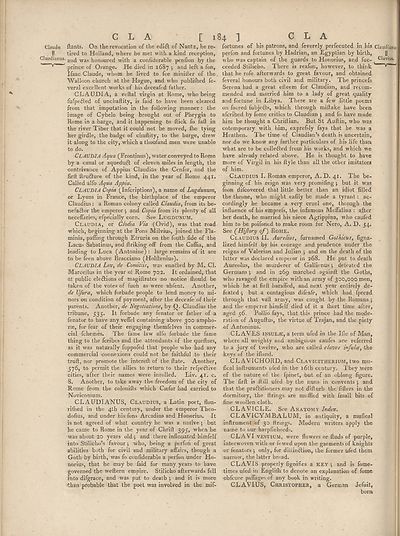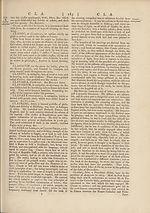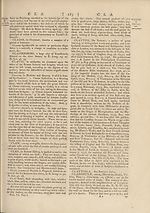Encyclopaedia Britannica, or, a Dictionary of arts, sciences, and miscellaneous literature : enlarged and improved. Illustrated with nearly six hundred engravings > Volume 6, CHI-Crystallization
(194) Page 184
Download files
Complete book:
Individual page:
Thumbnail gallery: Grid view | List view

C L A [ 184 1 C L A
Claude ftants. On the revocation of the edift of Nantz, he re-
II tired to Holland, where he met with a kind reception,
Claudianus. ancj was honoured with a confiderable penfion by the
’”""v prince of Orange. He died in 1687 ; and left a fon,
Ifaac Claude, whom he lived to fee miniiler of the
Walloon church at the Hague, and who publifhed fe-
veral excellent works of his deceafed father.
CLAUDIA, a veftal virgin at Rome, who being
fufpedled of unchaftity, is faid to have been cleared
from that imputation in the following manner: the
image of Cybele being brought out of Phrygia to
Rome in a barge, and it happening to flick fo fall in
the river Tiber that it could not be moved, flie tying
her girdle, the badge of chaftity, to the barge, drew
it along to the city, which a thoufand men were unable
to do.
CLAUDIA Aqua (Frontinus), water conveyed to Rome
by a canal or aquedudl of eleven miles in length, the
contrivance of Appius Claudius the Cenfor, and the
firft flruflure of the kind, in the year of Rome 441.
Called alfo Aqua Appia.
CLAUDIA Copia (Infcriptions), a name of Lugdunutn,
or Lyons in France, the birthplace of the emperor
Claudius: a Roman colony called Claudia, from its be¬
nefactor the emperor 5 and Copia from its plenty of all
neceffaries, efpecially corn. See Lugdunum.
Claudia, or Ciodia Via (Ovid), was that road
which, beginning at the Pons Milvius, joined the Fla-
minia, paffing through Etruria on the fouth fide of the
Lacus Sabatinus, and ftriking off from the Caffia, and
leading to Luca (Antonine) : large remains of it are
to be feen above Bracciano (Holltenius).
CLAUDIA Lex, de Comitiis, was enacted by M. CL
Marcellus in the year ol Rome 702. It ordained, that
at public eleClions of magiftrates no notice ftiould be
taken of the votes of fueh as were abfent. Another,
de Ufura, which forbade people to lend money to mi¬
nors on condition of payment, after the deceafe of their
parents. Another, de Negotiatione, by Q. Claudius the
tribune, 535. It forbade any fenator or father of a
fenator to have any veffel containing above 300 ampho¬
rae, for fear of their engaging themfelves in commer¬
cial fchemes. The fame law alio forbade the fame
thing to the fcribes and the attendants of the queftors,
as it was naturally fuppofed that people who had any
commercial connexions could not be faithful to their
truft, nor promote the intereft of the ftate. Another,
576, to permit the allies to return to their refpeftive
cities, after their names were inrolled. Liv. 41. c.
8. Another, to take away the freedom of the city of
Rome from the colonifts which Caefar had carried to
Novicomum.
CLAUDIANUS, Claudius, a Latin poet, flou-
rithed in the 4th century, under the emperor Theo-
dofius, and under his fons Arcadius and Honorius. It
is not agreed of what country he was a native 5 but
he came to Rome in the year of Chrift 395, when he
was about 20 years old 4 and there infinuated himfelf
into Stilicho’s favour; who, being a perfon of great
abilities both for civil and military affairs, though a
Goth by birth, was fo confiderable a perfon under Ho¬
norius, that he may be faid for many years to have
governed the weftern empire. Stilicho afterwards fell
into difgrace, and was put to death ; and it is more
than probable that the poet was involved in the mif-
fortunes of his patrons, and feverely perfecuted in his Claudianuf
perfon and fortunes by Hadrian, an Egyptian by birth, [|
who was captain of the guards to Honorius, and fuc- Clavius,
ceeded Stilicho. There is reafon, however, to think
that he rofe afterwards to great favour, and obtained
feveral honours both civil and military. The princefs
Serena had a great efleem for Claudian, and recom¬
mended and married him to a lady of great quality
and fortune in Libya. There are a few little poems
on facred fubjedls, which through miftake have been
afcribed by fome critics to Claudian } and fo have made
him be thought a Chrillian. But St Auftin, who was
cotemporary with him, exprefsly fays that he w-as a
Heathen. The time of Ciaudian’s death is uncertain,
nor do we know any farther particulars of his life than
what are to be colledled from his works, and which we
have already related above. He is thought to have
more of Virgil in his ftyle than all the other imitator*
of him.
Claudius I. Roman emperor, A. D. 41. The be¬
ginning of his reign was very promifing j but it ivas
foon difcovered that little better than an idiot filled
the throne, who might eafily be made a tyrant : ac¬
cordingly he became a very cruel one, through the
influence of his emprefs, the infamous Meffalina : after
her death, he married his niece Agrippina, who caufed
him to be poifontd to make room for Nero, A. D. 54.
See (Hi/lory of) Rome.
Claudius II. Aurelius, furnamed Gothicus, figna-
lized himfelf by his courage and prudence under the
reigns of Valerian and Julian ; and on the death of the
latter was declared emperor in 268. He put to death
Aureolus, the murderer of Gallienus; defeated the
Germans *, and in 269 marched againfi: the Goths,
who ravaged the-empire with an army of 300,000 men,
which he at firit harafled, and next year entirely de¬
feated $ but a contagious difeafe, which had fpread
through that vaft army, was caught by the Romans ;
and the emperor himfelf died of it a (hurt time after,
aged 56. Pollio fays, that this prince had the mode¬
ration of Auguftus, the virtue of Trajan, and the piety
of Antoninus.
CLAVES insula:, a term ufed in the Ifle of Man,
where all weighty and ambiguous caufes are referred
to a jury of twelve, who are called claves itifulce, the
keys of the ifland.
CLAVICHORD, and Clavicitherium, two mu-
fical inftruments uled in the 16th century. They were
of the nature of the fpinet, but of an oblong figure.
The firft is ftill uled by the nuns in convents ; and
that the pra£fitioners may not difturb the fifters in the
dormitory, the firings are muffled with fmall bits of
fine woollen cloth.
CLAVICLE. See Anatomy Index.
CLAVICYMBALUM, in antiquity, a mufical
inftrument of 30 firings. Modern writers apply the
name to our harpfichord*.
CLAVI vestium, were flowers or ftuds of purple,
interwoven with or fevved upon the garments of knights
or fenators ; only, for diiiindion, the former ufed them
narrow, the latter broad.
CLAVIS properly fignifies a KEY ; and is fome-
times ufed in Englifh to denote an explanation of fome
obfcure paffages of any book in writing.
CLAVIUS, Christopher, a German Jefuit,
born
Claude ftants. On the revocation of the edift of Nantz, he re-
II tired to Holland, where he met with a kind reception,
Claudianus. ancj was honoured with a confiderable penfion by the
’”""v prince of Orange. He died in 1687 ; and left a fon,
Ifaac Claude, whom he lived to fee miniiler of the
Walloon church at the Hague, and who publifhed fe-
veral excellent works of his deceafed father.
CLAUDIA, a veftal virgin at Rome, who being
fufpedled of unchaftity, is faid to have been cleared
from that imputation in the following manner: the
image of Cybele being brought out of Phrygia to
Rome in a barge, and it happening to flick fo fall in
the river Tiber that it could not be moved, flie tying
her girdle, the badge of chaftity, to the barge, drew
it along to the city, which a thoufand men were unable
to do.
CLAUDIA Aqua (Frontinus), water conveyed to Rome
by a canal or aquedudl of eleven miles in length, the
contrivance of Appius Claudius the Cenfor, and the
firft flruflure of the kind, in the year of Rome 441.
Called alfo Aqua Appia.
CLAUDIA Copia (Infcriptions), a name of Lugdunutn,
or Lyons in France, the birthplace of the emperor
Claudius: a Roman colony called Claudia, from its be¬
nefactor the emperor 5 and Copia from its plenty of all
neceffaries, efpecially corn. See Lugdunum.
Claudia, or Ciodia Via (Ovid), was that road
which, beginning at the Pons Milvius, joined the Fla-
minia, paffing through Etruria on the fouth fide of the
Lacus Sabatinus, and ftriking off from the Caffia, and
leading to Luca (Antonine) : large remains of it are
to be feen above Bracciano (Holltenius).
CLAUDIA Lex, de Comitiis, was enacted by M. CL
Marcellus in the year ol Rome 702. It ordained, that
at public eleClions of magiftrates no notice ftiould be
taken of the votes of fueh as were abfent. Another,
de Ufura, which forbade people to lend money to mi¬
nors on condition of payment, after the deceafe of their
parents. Another, de Negotiatione, by Q. Claudius the
tribune, 535. It forbade any fenator or father of a
fenator to have any veffel containing above 300 ampho¬
rae, for fear of their engaging themfelves in commer¬
cial fchemes. The fame law alio forbade the fame
thing to the fcribes and the attendants of the queftors,
as it was naturally fuppofed that people who had any
commercial connexions could not be faithful to their
truft, nor promote the intereft of the ftate. Another,
576, to permit the allies to return to their refpeftive
cities, after their names were inrolled. Liv. 41. c.
8. Another, to take away the freedom of the city of
Rome from the colonifts which Caefar had carried to
Novicomum.
CLAUDIANUS, Claudius, a Latin poet, flou-
rithed in the 4th century, under the emperor Theo-
dofius, and under his fons Arcadius and Honorius. It
is not agreed of what country he was a native 5 but
he came to Rome in the year of Chrift 395, when he
was about 20 years old 4 and there infinuated himfelf
into Stilicho’s favour; who, being a perfon of great
abilities both for civil and military affairs, though a
Goth by birth, was fo confiderable a perfon under Ho¬
norius, that he may be faid for many years to have
governed the weftern empire. Stilicho afterwards fell
into difgrace, and was put to death ; and it is more
than probable that the poet was involved in the mif-
fortunes of his patrons, and feverely perfecuted in his Claudianuf
perfon and fortunes by Hadrian, an Egyptian by birth, [|
who was captain of the guards to Honorius, and fuc- Clavius,
ceeded Stilicho. There is reafon, however, to think
that he rofe afterwards to great favour, and obtained
feveral honours both civil and military. The princefs
Serena had a great efleem for Claudian, and recom¬
mended and married him to a lady of great quality
and fortune in Libya. There are a few little poems
on facred fubjedls, which through miftake have been
afcribed by fome critics to Claudian } and fo have made
him be thought a Chrillian. But St Auftin, who was
cotemporary with him, exprefsly fays that he w-as a
Heathen. The time of Ciaudian’s death is uncertain,
nor do we know any farther particulars of his life than
what are to be colledled from his works, and which we
have already related above. He is thought to have
more of Virgil in his ftyle than all the other imitator*
of him.
Claudius I. Roman emperor, A. D. 41. The be¬
ginning of his reign was very promifing j but it ivas
foon difcovered that little better than an idiot filled
the throne, who might eafily be made a tyrant : ac¬
cordingly he became a very cruel one, through the
influence of his emprefs, the infamous Meffalina : after
her death, he married his niece Agrippina, who caufed
him to be poifontd to make room for Nero, A. D. 54.
See (Hi/lory of) Rome.
Claudius II. Aurelius, furnamed Gothicus, figna-
lized himfelf by his courage and prudence under the
reigns of Valerian and Julian ; and on the death of the
latter was declared emperor in 268. He put to death
Aureolus, the murderer of Gallienus; defeated the
Germans *, and in 269 marched againfi: the Goths,
who ravaged the-empire with an army of 300,000 men,
which he at firit harafled, and next year entirely de¬
feated $ but a contagious difeafe, which had fpread
through that vaft army, was caught by the Romans ;
and the emperor himfelf died of it a (hurt time after,
aged 56. Pollio fays, that this prince had the mode¬
ration of Auguftus, the virtue of Trajan, and the piety
of Antoninus.
CLAVES insula:, a term ufed in the Ifle of Man,
where all weighty and ambiguous caufes are referred
to a jury of twelve, who are called claves itifulce, the
keys of the ifland.
CLAVICHORD, and Clavicitherium, two mu-
fical inftruments uled in the 16th century. They were
of the nature of the fpinet, but of an oblong figure.
The firft is ftill uled by the nuns in convents ; and
that the pra£fitioners may not difturb the fifters in the
dormitory, the firings are muffled with fmall bits of
fine woollen cloth.
CLAVICLE. See Anatomy Index.
CLAVICYMBALUM, in antiquity, a mufical
inftrument of 30 firings. Modern writers apply the
name to our harpfichord*.
CLAVI vestium, were flowers or ftuds of purple,
interwoven with or fevved upon the garments of knights
or fenators ; only, for diiiindion, the former ufed them
narrow, the latter broad.
CLAVIS properly fignifies a KEY ; and is fome-
times ufed in Englifh to denote an explanation of fome
obfcure paffages of any book in writing.
CLAVIUS, Christopher, a German Jefuit,
born
Set display mode to:
![]() Universal Viewer |
Universal Viewer | ![]() Mirador |
Large image | Transcription
Mirador |
Large image | Transcription
Images and transcriptions on this page, including medium image downloads, may be used under the Creative Commons Attribution 4.0 International Licence unless otherwise stated. ![]()
| Permanent URL | https://digital.nls.uk/193009945 |
|---|
| Attribution and copyright: |
|
|---|
| Description | Ten editions of 'Encyclopaedia Britannica', issued from 1768-1903, in 231 volumes. Originally issued in 100 weekly parts (3 volumes) between 1768 and 1771 by publishers: Colin Macfarquhar and Andrew Bell (Edinburgh); editor: William Smellie: engraver: Andrew Bell. Expanded editions in the 19th century featured more volumes and contributions from leading experts in their fields. Managed and published in Edinburgh up to the 9th edition (25 volumes, from 1875-1889); the 10th edition (1902-1903) re-issued the 9th edition, with 11 supplementary volumes. |
|---|---|
| Additional NLS resources: |
|

